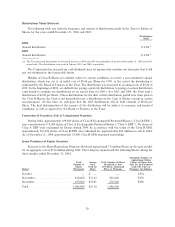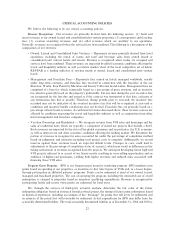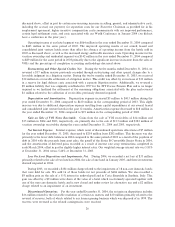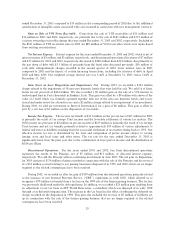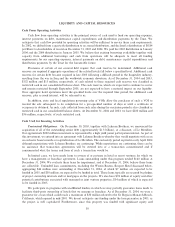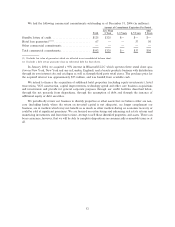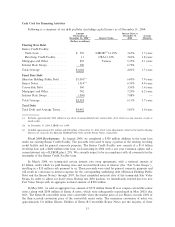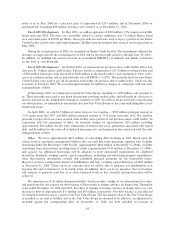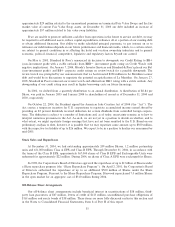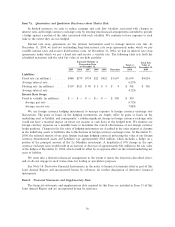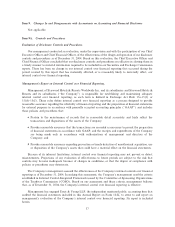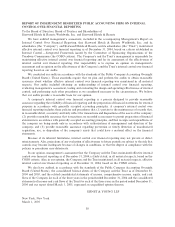Starwood 2004 Annual Report Download - page 38
Download and view the complete annual report
Please find page 38 of the 2004 Starwood annual report below. You can navigate through the pages in the report by either clicking on the pages listed below, or by using the keyword search tool below to find specific information within the annual report.LIQUIDITY AND CAPITAL RESOURCES
Cash From Operating Activities
Cash Öow from operating activities is the principal source of cash used to fund our operating expenses,
interest payments on debt, maintenance capital expenditures and distribution payments by the Trust. We
anticipate that cash Öow provided by operating activities will be suÇcient to service these cash requirements.
In 2002, we shifted from a quarterly distribution to an annual distribution, and declared a distribution of $0.84
per Share to shareholders of record on December 31, 2003 and 2004. We paid the 2003 distribution in January
2004 and the 2004 distribution in January 2005. We believe that existing borrowing availability together with
capacity from additional borrowings and cash from operations will be adequate to meet all funding
requirements for our operating expenses, interest payments on debt, maintenance capital expenditures and
distribution payments by the Trust for the foreseeable future.
Provisions of certain of our secured debt require that cash reserves be maintained. Additional cash
reserves are required if aggregate operations of the related hotels fall below a speciÑed level. Additional cash
reserves for certain debt became required in late 2003 following a diÇcult period in the hospitality industry,
resulting from the war in Iraq and the worldwide economic downturn. As of December 31, 2004 and 2003,
$132 million and $13 million, respectively, of cash related to these required cash reserves was classiÑed as
restricted cash in our consolidated balance sheet. The cash reserves, which are expected to continue to accrue
and remain restricted through September 2005, are not expected to have a material impact on our liquidity.
Once aggregate hotel operations meet the speciÑed levels over the required time period, the additional cash
reserves, plus accrued interest, will be released to us.
In addition, state and local regulations governing sales of VOIs allow the purchaser of such a VOI to
rescind the sale subsequent to its completion for a pre-speciÑed number of days or until a certiÑcate of
occupancy is obtained. As such, cash collected from such sales during the rescission period is also classiÑed as
restricted cash in our consolidated balance sheets. At December 31, 2004 and 2003, we have $200 million and
$56 million, respectively, of such restricted cash.
Cash Used for Investing Activities
Contractual Obligations. On December 30, 2003, together with Lehman Brothers, we announced the
acquisition of all of the outstanding senior debt (approximately $1.3 billion), at a discount, of Le Meridien.
Our approximate $200 million investment is represented by a high yield junior participation interest. As part of
this investment, we entered into an agreement with Lehman Brothers whereby they would negotiate with us on
an exclusive basis towards a recapitalization of Le Meridien. The exclusivity period expired in early April 2004
although negotiations with Lehman Brothers are continuing. While negotiations are continuing, there can be
no assurance that transaction agreements will be entered into or a transaction consummated and if
consummated what the terms and form of such a transaction would be.
In limited cases, we have made loans to owners of or partners in hotel or resort ventures for which we
have a management or franchise agreement. Loans outstanding under this program totaled $160 million at
December 31, 2004. We evaluate these loans for impairment, and at December 31, 2004, believe these loans
are collectible. Unfunded loan commitments, excluding the Westin Boston, Seaport Hotel discussed below,
aggregating $46 million were outstanding at December 31, 2004, of which $7 million are expected to be
funded in 2005 and $30 million are expected to be funded in total. These loans typically are secured by pledges
of project ownership interests and/or mortgages on the projects. We also have $78 million of equity and other
potential contributions associated with managed or joint venture properties, $34 million of which is expected
to be funded in 2005.
We participate in programs with unaÇliated lenders in which we may partially guarantee loans made to
facilitate third-party ownership of hotels that we manage or franchise. As of December 31, 2004, we were a
guarantor for a loan which could reach a maximum of $30 million related to the St. Regis in Monarch Beach,
California, which opened in mid-2001. We do not anticipate any funding under the loan guarantee in 2005, as
the project is well capitalized. Furthermore, since this property was funded with signiÑcant equity and
30


